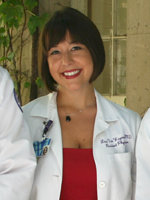
Bringing together mentors at the top of their respective fields, Lisa VanWagner, Weinberg ’03, MD, MS ’11, a fellow in the Division of Gastroenterology and Hepatology, is working to add fact to physician opinion when considering cardiovascular disease (CVD) prior to liver transplantation. Patients with known CVD, such as a prior heart attack, who undergo a liver transplant, have increased mortality and morbidity one year after surgery.
“Liver transplant candidates today are increasingly older and have more cardiovascular risk factors and comorbidities – obesity, diabetes mellitus, high blood pressure, high cholesterol – than ever before. In addition, there are specific cardiovascular manifestations of end-stage liver disease that can increase risk for liver transplant candidates following surgery,” VanWagner said. “Assessing the impact of cardiovascular disease and other clinical factors on outcomes after liver transplant, and determining risk predictors for poor outcomes, is vital to improving the clinical management of liver transplant recipients and to maximizing the benefit of scarce donor organs.”
VanWagner and mentors Anton Skaro, MD, PhD, assistant professor of organ transplantation, and Michael Abecassis, MD, MBA, director of the Comprehensive Transplant Center, will be collaborating with Donald Lloyd-Jones, MD, ScM, professor of cardiology, chair of preventive medicine, and director of the Northwestern University Clinical and Translational Sciences Institute (NUCATS). The group will use innovative risk assessment techniques to better discover and delineate the cardiovascular risks associated with end-stage liver disease and organ transplantation.
“This collaboration allows us to leverage the resources at Northwestern with a focus on improving patient outcomes through the development of a liver transplant specific cardiovascular risk index,” VanWagner said. “As an internist and trainee in hepatology with relationships with each of these mentors, I have been able to bring these leaders together to work on what I believe is a pressing issue in the area of transplant medicine.”
Over the next two years the investigators will identify and document predictors of cardiovascular complications 30 days after liver transplantation. The resulting Liver Transplantation Cardiovascular Risk Index will enable doctors to provide individualized treatment decisions and personalized medicine for transplant candidates. It could also be used to modify national Scientific Registry of Transplant Recipients risk models.
“We have begun the data collection phase of the project, which involves accessing both national and local transplant databases. We will not be directly working with patients as the data is already in existence,” VanWagner said. “This research will potentially affect all waitlisted liver transplant candidates in the United States if we are successful in developing a unique liver transplant specific risk profile that is predictive of post-transplant outcomes.”
VanWagner’s previous research experience has focused on liver transplant outcomes using facility-specific data, the results of which have been presented at local and national meetings, with two first-author manuscripts published. Each of these previous studies was completed while she was a chief medical resident in internal medicine at Northwestern.
“Prior to the beginning of my residency, I had no formal training in research design or biostatistics but I have since developed skills in study design, statistical analysis, and writing, and I have gained initial experience in working with center-specific databases,” VanWagner said. “I have not yet worked with large national databases and thus this training fellowship will expand my skills in data management and statistical analysis and will serve as an important foundation for further training and research studies as I pursue a career as a transplant hepatology clinician-scientist.”
VanWagner’s research is supported by a National Heart, Lung and Blood Institute National Research Service Award.






